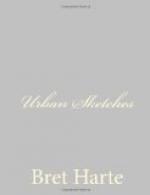His intention on leaving the door-steps of his dwelling was to proceed without delay to Van Dieman’s Land, by way of Second and Market streets. This project was subsequently modified so far as to permit a visit to Otaheite, where Captain Cook was killed. The outfit for his voyage consisted of two car-tickets, five cents in silver, a fishing-line, the brass capping of a spool of cotton, which, in his eyes, bore some resemblance to metallic currency, and a Sunday-school library ticket. His garments, admirably adapted to the exigencies of any climate, were severally a straw hat with a pink ribbon, a striped shirt, over which a pair of trousers, uncommonly wide in comparison to their length, were buttoned, striped balmoral stockings, which gave his youthful legs something of the appearance of wintergreen candy, and copper-toed shoes with iron heels, capable of striking fire from any flagstone. This latter quality, Master Charley could not help feeling, would be of infinite service to him in the wilds of Van Dieman’s Land, which, as pictorially represented in his geography, seemed to be deficient in corner groceries and matches.
Exactly as the clock struck the half-hour, the short legs and straw hat of Master Charles Summerton disappeared around the corner. He ran rapidly, partly by way of inuring himself to the fatigues of the journey before him, and partly by way of testing his speed with that of a North Beach car which was proceeding in his direction. The conductor, not being aware of this generous and lofty emulation, and being somewhat concerned at the spectacle of a pair of very short, twinkling legs so far in the rear, stopped his car and generously assisted the youthful Summerton upon the platform. From this point a hiatus of several hours’ duration occurs in Charles’s narrative. He is under the impression that he “rode out” not only his two tickets, but that he became subsequently indebted to the company for several trips to and from the opposite termini, and that at last, resolutely refusing to give any explanation of his conduct, he was finally ejected, much to his relief, on a street corner. Although, as he informs us, he felt perfectly satisfied with this arrangement, he was impelled under the circumstances to hurl after the conductor an opprobrious appellation which he had ascertained from Patsey was the correct thing in such emergencies, and possessed peculiarly exasperating properties.
We now approach a thrilling part of the narrative, before which most of the adventures of the “Boys’ Own Book” pale into insignificance. There are times when the recollection of this adventure causes Master Charles to break out in a cold sweat, and he has several times since its occurrence been awakened by lamentations and outcries in the night season by merely dreaming of it. On the corner of the street lay several large empty sugar hogsheads. A few young gentlemen disported themselves therein, armed with sticks, with which they removed the sugar which




